Growing potatoes using the Chinese method
When growing potatoes, farmers use different planting methods, for example, in holes, with ridges. Chinese agronomists have developed their own simple technology - in a hole or trench. This method allows you to plant several varieties in one hole and makes it easier to care for the crop.
We will tell you further how the Chinese grow potatoes and whether this method can be used in Russia.
What is the Chinese method of growing potatoes based on?
The Chinese method of planting potatoes is based on the ability of bushes to grow shoots underground (stolons), at the ends of which tubers are formed. The more underground stolons are formed, the more tubers will form and grow. Accordingly, it will be possible to harvest more crops in a small area.
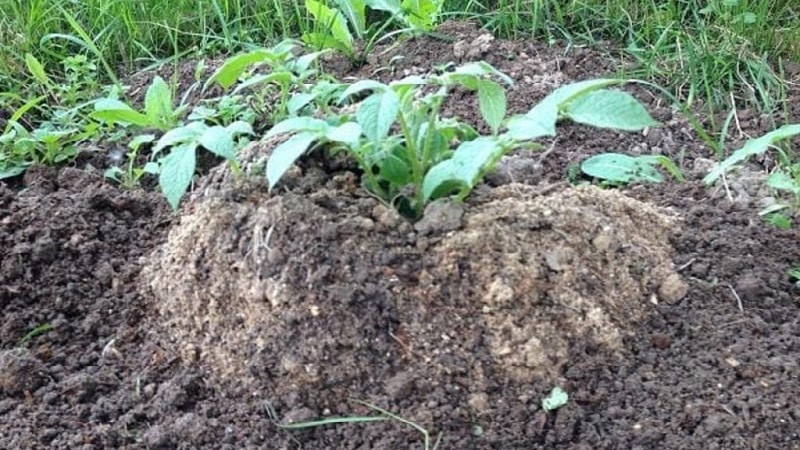
Besides, Less seed material is used when plantingthan usual, since it is assumed that each tuber will produce several times more underground shoots.
Chinese method potatoes require minimal care, infrequent watering and a small area. And with such cultivation, the Colorado potato beetle cannot reach the foliage.
How is it different from normal
When planting in the usual way, make holes 8-12 cm deep. As it grows, the bush is hilled up, raking the soil in a mound around the tops. Due to this, the growth of underground shoots is stimulated. If you plant potatoes in Chinese style, you need to dig a deep hole, about 50 cm, put the tubers in it and cover them with soil mixed with mulch and fertilizers.As the bush grows, nutrient soil is added. In deep holes, the soil dries out more slowly, so this method requires watering less often.
Reference. Bushes growing in Chinese style do not require weeding or hilling.
Is it worth planting Chinese potatoes?
The idea of growing a large crop of potatoes in a small area attracts many summer residents. But not many have managed to grow the declared volumes yet.
Mainly when used unusual method gardeners get about 1.3-2 kg of potatoes per tuber. Breeders stated 10-15 kg. The reason for this discrepancy in yield may be the wrong choice of variety (we will talk about this later), or the difference in climatic conditions of China and Russia. The experimental pit does not take up much space, so many people decide to try the new method.
The Chinese method has many advantages over traditional planting.:
- a small area is allocated for planting potatoes, while the usual method requires many long beds;
- using a small amount of planting material, since with the Chinese method one tuber forms several kilograms of potatoes;
- no weeding or hilling of bushes required;
- water less often, but more abundantly;
- the crop is rarely affected by the Colorado potato beetle;
- the use of chemical pest control agents is not required.
There are also disadvantages:
- the method does not guarantee high yields;
- it is difficult to manually dig a deep, voluminous hole or trench;
- it is necessary to correctly calculate the amount of fertilizer when preparing the soil;
- not all varieties are suitable for this method.
Chinese potato planting technology
Only high-yielding varieties are suitable for Chinese planting: Bernina, Madeira, Giant, Arizona, Evolution. Varieties with average yields will not give the expected results. To increase productivity, it is necessary to create optimal conditions under which stolons will form along the entire length of the stem.
It is necessary to sprinkle the young shoots with soil in time so that they do not have time to turn green. It is recommended to apply the powder at the moment the foliage appears.
Attention! To prepare a hole or trench, light, breathable soil is needed. On heavy, clayey soils, the crop will develop poorly and have difficulty forming tubers.
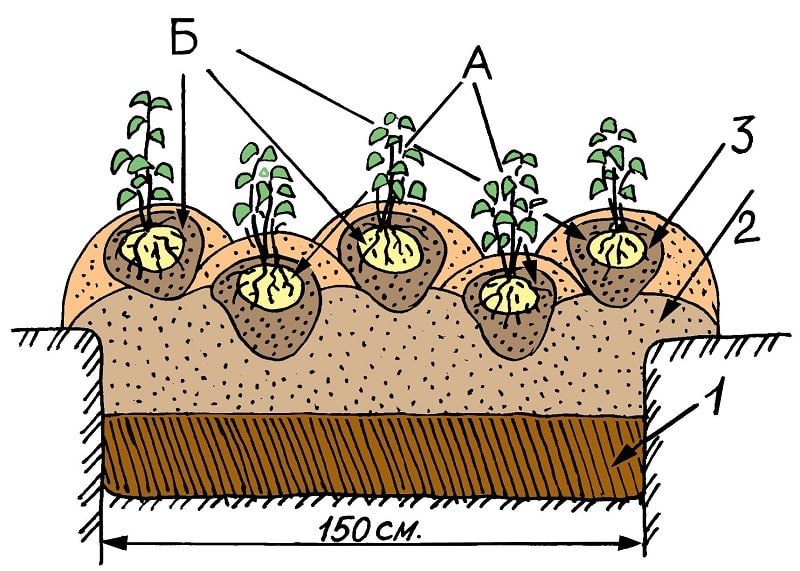
Preparation of planting material
For planting using an unusual method, healthy, undamaged medium-sized tubers are selected. Pre-selected planting material is stored at a temperature of no more than +15°C.
Immediately before planting, the tubers are laid out in a warm room with an air humidity of 60-65% in good lighting until the potatoes begin to turn green and sprout. This usually takes 15-20 days. When the length of the shoots reaches 3-4 cm, part of the pulp is removed along the circumference of the tubers in the middle. The incision is made no deeper than 1 cm and no wider than 1.5 cm.
Important! To prevent decay, the places where the pulp is removed are treated with wood ash and slightly dried.
Potatoes in a hole
One of the methods of Chinese planting is growing in a hole.. To do this, you need to choose the right variety and adhere to the recommended technology. Chinese breeders, when growing 1-2 tubers in one pit, manage to harvest up to 20 kg.
Landing
For planting, dig a hole 50 cm deep and 60-70 cm in diameter.. Half a bucket of prepared earthen mixture with the addition of compost, rotted manure, wood ash, and superphosphate is poured into the bottom.Carefully place one tuber on top of the nutrient mixture so as not to damage the sprouts. Some gardeners place two tubers to be on the safe side. The potatoes are sprinkled with a 10 cm layer of earthen mixture and slightly moistened.
When the seedlings reach 15 cm in height, add soil around the stem. 5-6 cm of the stem is left above the soil level. When the tops reach 20 cm, the bush is again covered with a nutrient mixture, leaving 5 cm of the top on the surface. This procedure is carried out as the bush grows. Ultimately, the hole with the bush is completely filled up, and a small mound is formed around the tops, from which only the upper leaves are visible.
Attention! Before each application, the leaves are removed from the bottom of the tops. Only the stems should remain underground.
14-20 days after flowering, the tops are cut off, leaving 15 cm above the surface. After the tops dry out, harvesting begins.
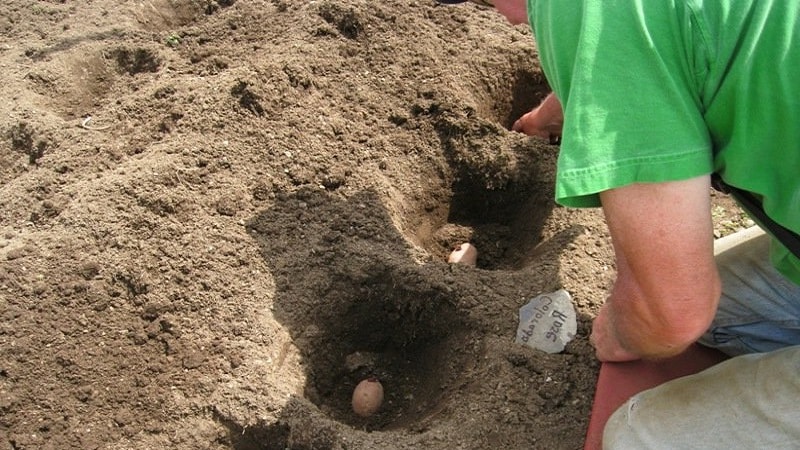
Care
New planting method involves frequent application of fertilizers. When the first shoots appear, a solution of potassium sulfate (15 g per 10 liters of water) and a solution of bird droppings (1:30) are added to the soil. Foliar feeding is carried out with fertilizers containing magnesium. After drying the tops, add earthen mixture. Feeding promote the formation of additional stolons.
Fertilizers are applied before each application of the bush.: organic matter around the stem, mineral fertilizing is carried out along the tops. Pollination of tops with wood ash gives good results. Ash enriches the soil with potassium and prevents the occurrence of diseases and pests.
Important! The concentration of applied fertilizers is half as much as when growing potatoes in the traditional way.
Watering is carried out after the soil layer dries to a depth of 10-12 cm. 8-10 liters of water are added to the pit.When the bush blooms, the volume of liquid is increased to 12-15 liters. Some time after watering, the soil is loosened to remove the soil crust. This promotes better aeration of the lower layers of soil in the pit. In order for the potato bush to retain more strength to form new tubers, some of the buds are removed.
Although the appearance Colorado potato beetle It’s unlikely that garlic or calendula will be planted near the pit to really protect the plantings. Their aroma repels the beetle. When spreading, you can add onion peels to the soil, thereby preventing the appearance of wireworms.
Potatoes in beds
Chinese potato beds are similar to traditional ones, but Upon closer inspection, you can see the difference. Gardeners who like to experiment plant several varieties in one bed.
Caring for the beds is simple. The main condition is periodic loosening of the soil. The beds do not require constant hilling and weeding. The multilayer soil mixture does not require frequent watering. Soil moisture is monitored only during flowering and ovary formation. Feeding with ash protects the underground parts of the plant from rotting.
In the trench
If the size of the plot allows, you can use the Chinese method of growing crops in trenches. For this you need:
- Dig a trench 50 cm deep. Place a nutrient mixture at the bottom.
- Make holes at the bottom with a depth of 25-30 cm and a diameter of 55-60 cm. Leave the distance between the holes 25-28 cm.
- Pour 20 g of ash and 10 g of superphosphate into each well.
- Place 1-2 prepared tubers in the moistened earthen mixture, cover with a layer of the mixture, and water.
- Cover the mounds formed at the bottom of the trench with straw mulch. Straw retains moisture, preventing the soil from drying out, and provides good air access to the roots.
- When young shoots reach 15 cm, they need to be sprinkled with a nutrient mixture, ash, fertilizer, then mulch.
- The procedure for adding the mixture is carried out as the tops grow, each time reducing the amount of fertilizing until the stems grow 15-18 cm above the soil level.
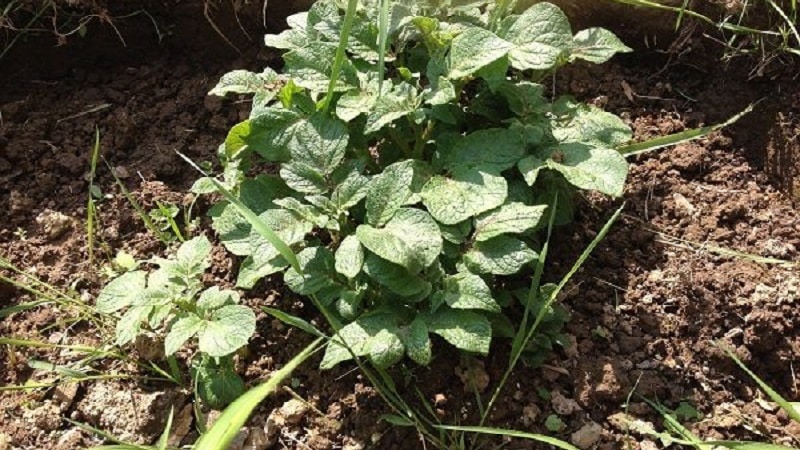
Double Harvest
Farmers in China use a method of planting crops in which it is possible to get two harvests from each bed. To do this, two varieties are planted in parallel at different depths. The first harvest is harvested in mid-June, the second at the end of July.
To get a double harvest you need:
- Dig a trench 1.3-1.5 m wide and 40 cm deep.
- Place a layer of rotted manure 10-15 cm thick on the bottom.
- Cover the manure with a layer of soil.
- Make two parallel furrows above the manure layer at a distance of 60 cm.
- Place humus and wood ash into the furrows.
- Place tubers of an early ripening variety in the furrow and sprinkle with a layer of 5-6 cm of earthen mixture. With a thicker layer of soil, seedlings will appear a few days later.
- As soon as the seedlings reach 15-18 cm, carry out hilling.
- 2-3 days after hilling, make three more beds along the edges and between the two previous beds.
- Pour humus and ash into them and place medium-late variety tubers.
During the potato harvest, mid-late potatoes are earthed up in the first beds. Thus, two crops are obtained on one area.
Under film in a greenhouse
In the northern regions of China, the soil in greenhouses for planting crops is prepared at the end of winter. Burning coals are placed in trenches, thereby warming the ground for planting early ripening varieties. The soil temperature is controlled. Its optimal indicator for the formation of new tubers is +18…+20°C.
Planting and care
When the soil in the trench warms up to +18°C, the prepared tubers are planted. A layer of covering material (lutrasil, agrospan) is laid over the beds to retain moisture and heat. The material prevents the appearance of weeds. Fasteners are installed above the trench, on which the film is stretched. It serves as shelter from the cold and scorching sun rays. With the onset of heat, the film is removed.
Transformation of the Chinese method into the Russian way
Following the rules of the Chinese method, Russian gardeners have mastered planting potatoes in large plastic bags, sugar bags, cereals. For stability, the bags can be dug shallow into the ground, placed near a support, the wall of a building, or along paths on the site. Containers with tubers should be in a well-lit place.
It is better if the bags are placed on a surface that can absorb excess moistureflowing down from plantings after watering. The good thing about this method is that you don’t have to dig up the crop. You just need to cut the bag and collect the tubers.
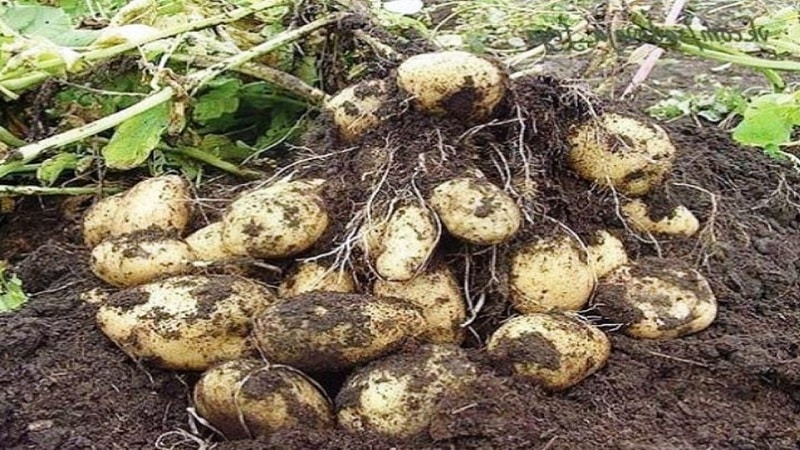
Harvesting
Let's return to how the Chinese plant and harvest potatoes. When the potato tops are completely dry, harvesting begins..
Using a shovel, carefully rake the soil, removing layer by layer to the bottom of the hole or trench, while selecting new tubers.
Conclusion
When using the Chinese method, high yields are achieved if the variety is chosen correctly. During the growing process, you must strictly adhere to the recommended rules of agricultural technology, and then the new method will allow you to get even a double harvest from a small plot.